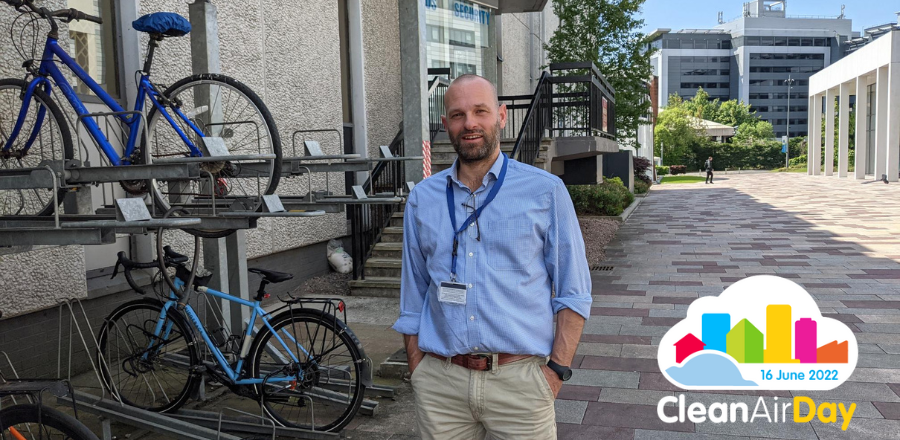GCU’s Sustainability Officer shares top tips as part of Clean Air Day

The GCU community are being asked to consider their impact on the environment as part of Clean Air Day.
With air pollution causing up to 36,000 deaths each year in the UK, Clean Air Day (16th June) aims to raise awareness of the current climate by bringing together communities, businesses, schools and the health sector.
We spoke to GCU’s Sustainability Officer, Paulo Cruz, to find out about some of the anti-pollution initiatives in place across the University, Glasgow and Scotland.
Here’s what he had to say:
There’s a climate emergency and the University has a commitment to carbon neutrality by 2040, five years earlier than the Scottish Government’s target of 2045. It’s not directly linked to air quality but some of the issues that contribute to greenhouse gasses are related to transport.
Travel
50% of our carbon footprint comes from students and staff travelling. We’ve got our Sustainable Travel Plan that seeks to reduce the greenhouse gas emissions associated with travel, some of those will have a positive impact on air pollution. We’re trying to encourage people to get out their cars and move to public transport or cycling. About 50% of our students live within walking and cycling distance of the university.
We have dedicated travel advisers who talk to students during Freshers’ and Registration about how they will get to and from campus. The idea is to help the 50% realise that they can walk or cycle and it’s going to take them a lot less time than they think – while also saving them money.
Young Persons’ Free Bus Travel Scheme
This year, the travel advisers will also be highlighting the free bus pass that the Scottish Government introduced for under 22s, and they’ll also be sharing tips on car sharing and efficient driver habits. The environmental impact of a car is lower if there’s more than one person in it, in comparison to if it’s just a solo traveler, so if you are going to drive then try to get more people in your car.
It’s important to look at how much we personally pollute; one person in a car will pollute far more than 50 people in a bus. The more people we can get on a bus – the less cars there are – the less cars there are – the faster traffic flows in the city centre, meaning there’s less pollution.
All you need for The Young Persons’ Free Bus Travel Scheme is a National Entitlement Card or a new Young Scot Card.
Dr Bike
Dr Bike was introduced as part of our approach to address common barriers to cycling. One of the issues was that people’s bikes weren’t fixed, so they weren’t using them. We thought we’d keep people cycling by making sure their bikes are at least road worthy. Dr Bike does basic bike repairs: like brake pads and gear alignment – just to make sure your bike is safe to use. The more people use their bikes, the less they’re on other modes of transport that are more polluting. We don’t currently have any sessions planned but, once it’s back up and running, everyone is welcome and it’s free on a first come, first served basis.
Glasgow Low Emissions Zone (LEZ)
This is a city wide move to address air pollution but it will have a big impact on our ability to attend class at University. Phase 2 of the LEZ is already in place and your car will need to be of a certain age if you drive south of the M8, East of the M8, Saltmarket, High Street or the River Clyde. Cars allowed must have been registered after 2006 if they’re petrol, or September 2015 if they’re diesel. Fines are being introduced from next year and will be £60-£482 as a fixed penalty. For more information, click here.
Planes, trains and automobiles
The University plans to electrify our transport fleet over the next few years in response to the Low Emissions Zone and our climate neutrality aspirations. We’re looking to develop an anti-idling campaign which supports Glasgow’s LEZ: If a commercial vehicle or any vehicle comes on campus then we will strongly discourage you to leave your engine running; which again has obvious benefits for everyone.
There is also an advisory policy in place where you shouldn’t fly to destinations you can reach by train in six hours. When we were considering how we could move towards carbon neutrality, we looked at measures we could take across all modes of transport. There was one easy measure for business flights…don’t fly! The most sustainable journey any of us can make is not to make it.
By Ross Clark
Got an SHLS or GSBS story? Email Ross.Clark@gcu.ac.uk or connect with me on Twitter
